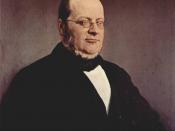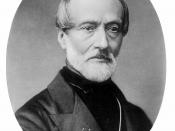The three revolutionaries Giuseppe Garibaldi, Giuseppe Mazzini, and Count Camillo Benso di Cavour are the primary names associated with the process by which the many governments of the Italian peninsula came together as a unified kingdom. They all were pivotal in this unification process. In the years between 1830 and 1848 many events occurred in the country of Italy. The primary problems in Italy were a mix of economic depression, social clash, and radical ideas. Secret societies were formed, and because of this, many people were thrown in prison. However, being jailed did not stop or even hinder the revolutions, as the Italians were determined to reach their independence from the Austrians.
Giuseppe Mazzini was always surrounded by political dissent, and the resentment against the German-speaking foreigners in Vienna whose armies crushed Italian aspirations toward self-government. At the young age of 21, Mazzini began to combine opposition to all existing governments, desire for political freedom, and Italian nationalism into one, unified cause.
At this time he also decided to wear only black clothing in order to express his mourning over the loss of Italian freedoms. The turning point of his life and eventually, one can argue, the turning point of Italy occurred in 1830 when Mazzini joined the conspiratorial society of the Carbonari. The Carbonari was a loosely organized group of liberal and radical revolutionaries. In this group Mazzini attended illegal meetings, distributed banned newspapers, acquired weapons, and took part in riotous antigovernment demonstrations.
Mazzini's passion for Italy was essentially the driving force of his life. He was arrested and spent six months in a local fortress. During this time in solitude, he received his life's calling; to devote his existence to the emancipation of Italy. He derived his motto "God and the People". This motto was well thought...



Hmmm
this did not seem like an 11th grade paper to me, but the writer did a fine job of explaining The Italian Revolution.
Thanks
kevin
2 out of 3 people found this comment useful.